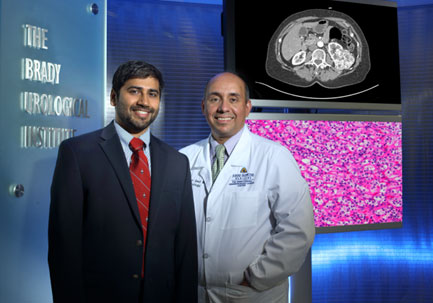-
Mohammad E. Allaf, MD

Primary Location: Johns Hopkins Health Care & Surgery Center - Green Spring Station, Lutherville, Lutherville, MD
-
Nirmish Singla, MD MSC

Primary Location: Johns Hopkins Health Care & Surgery Center - Green Spring Station, Lutherville, Lutherville, MD
Conditions We Treat: Kidney Cancer
Treatment for kidney cancer can vary widely depending on the tumor’s stage and whether the cancer has spread to other organs. Small tumors may not need immediate surgery, while cancer that has spread will require a complex and multidisciplinary approach.
On This Page:
Appointment Information | Treatment Options | Our Experts | Charitable Giving
Kidney Cancer: Why Choose Johns Hopkins

- Our Mission Statement: The Kidney Cancer Program at Johns Hopkins Medicine strives to offer world-class, multidisciplinary clinical care to patients with kidney tumors coupled with collaborative research to continuously improve the care of patients with kidney tumors around the world.
- Our clinical team includes experts in urologic surgery, medical oncology, radiation oncology, nephrology, pathology and radiology. This multidisciplinary approach is especially important to develop individualized treatment plans for each patient.
- We employ the most cutting-edge approaches to diagnosis and treatment including minimally-invasive/robotic surgical techniques, novel molecular imaging and the newest combination systemic therapies, with the opportunity to enroll in clinical trials when appropriate.
- We have an actively growing multidisciplinary research program that includes six primary research sub-programs: Fundamental Biology, Immuno-Oncology, Molecular Imaging, Novel Therapeutics, Biomarker Discovery, Stereotactic Radiation and Engineering. Our basic, clinical and translational research efforts are built on several internal and external collaborations spanning across urology, medical oncology, radiation oncology, nephrology, pathology, radiology, immunology, basic science, biomedical engineering, bioinformatics, statistics and epidemiology.
Our Research Sub-Programs
Fundamental Biology
Understanding how kidney cancers develop and grow

Immuno-Oncology
Molecular Imaging
Novel Therapeutics
Biomarker Discovery
Stereotactic Radiation
Engineering
The foundation of our Kidney Cancer Program is three pillars: Patient Care, Research and Education. In accordance with these pillars, we have the following programmatic Objectives:
- To improve survival and reduce treatment-related morbidity among patients with kidney cancer
- To characterize the biology of kidney cancer and translate scientific discoveries from the laboratory to the patient
- To improve imaging techniques and identify non-invasive biomarkers to improve diagnostic, prognostic, and predictive tools for patients with kidney cancer
- To identify therapeutic targets, develop novel drugs, lead clinical trials, and understand mechanisms of therapeutic resistance
- To establish a multidisciplinary clinic comprised of experts who integrate cutting-edge approaches to the diagnosis and treatment of kidney cancer
- To personalize the care of patients across the full spectrum of kidney cancer, including localized, locally advanced, and metastatic disease
- To foster educational opportunities and engage students and trainees in kidney cancer research
Our Kidney Cancer Program
Learn more about kidney cancer care at Johns Hopkins from urologic oncologist Nirmish Singla.
Partial Nephrectomy | Bobby Labonte's Story
Hear from Bobby and his urologic surgeons, Mohamad Allaf and Nirmish Singla, about his journey to recovery.
Kidney Cancer | Sue's Story
Sue was surprised to learn that her fractures were due to metastatic kidney cancer. Hear her tell her story.
Request An Appointment Request An Appointment
Schedule by phone
Understanding Kidney Cancer
Urologic oncologist and director of the Kidney Cancer Program, Nirmish Singla, M.D., M.Sc., answers some common questions about kidney cancer.
Learn more about kidney cancerTreatment for Kidney Cancer
One size does not fit all when it comes to kidney cancer treatment. Your surgeon will tailor treatment options depending on the extent of your cancer, whether it has spread to other organs and if you have any other health conditions.
For small tumors that have not spread, you may be a candidate for our active surveillance program, in which you will receive regular observation and imaging, but treatment is delayed unless the tumor grows.
Our experts treat hundreds of patients each year using a complete range of surgical techniques:
Open Surgery
- Nephrectomy with vein/vena cava involvement
- Radical nephrectomy (total kidney removal)
- Partial nephrectomy (kidney-sparing surgery)
Minimally Invasive Techniques
- Robotic kidney surgery
- Laparoscopic radical or partial nephrectomy
- Thermal ablation
While surgery is the primary treatment for localized kidney cancer, some treatments may also integrate therapies such as radiation or immunotherapy.
Kidney Cancer Experts
Each member of our kidney cancer team is dedicated to providing compassionate care while developing the most effective, advanced and personalized treatment plan for you.
Surgeons
Medical Oncologists
Radiation Oncologists
-
Daniel Yeong-Jin Song, MD

Primary Location: Sidney Kimmel Comprehensive Cancer Center, Baltimore, MD

















